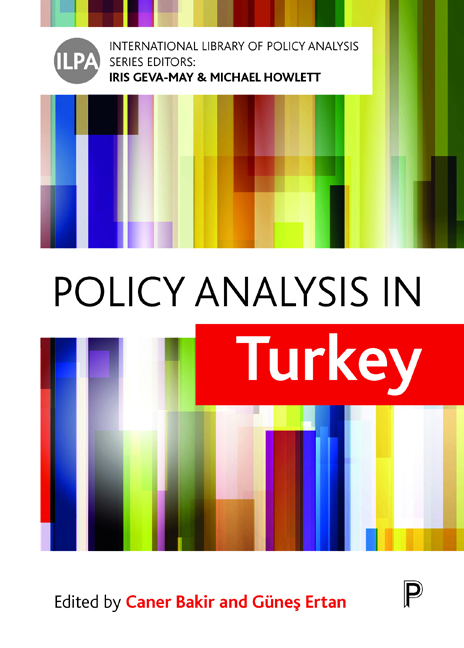Book contents
- Frontmatter
- Contents
- List of tables and figures
- Notes on contributors
- Editors’ introduction to the series
- one Pushing the pendulum from politics to policy: the state of policy analysis in Turkey
- Part One Historical roots, styles and methods of policy analysis in Turkey
- Part Two Policy analysis by governments
- Part Three Experts, international actors and public opinion
- Part Four Parties and civil society-based policy analysis
- Part Five Academic, bureaucratic and advocacy-based policy analysis
- Index
nine - Europeanisation of policy-making in Turkey and its limits
Published online by Cambridge University Press: 19 April 2022
- Frontmatter
- Contents
- List of tables and figures
- Notes on contributors
- Editors’ introduction to the series
- one Pushing the pendulum from politics to policy: the state of policy analysis in Turkey
- Part One Historical roots, styles and methods of policy analysis in Turkey
- Part Two Policy analysis by governments
- Part Three Experts, international actors and public opinion
- Part Four Parties and civil society-based policy analysis
- Part Five Academic, bureaucratic and advocacy-based policy analysis
- Index
Summary
Introduction
Domestic policy-making processes are exposed to external influences and/or pressures in a world of increasing globalisation. One extreme form of influence and/or pressure stems from Turkey's process of accession to the European Union (EU). As the long(est) standing candidate for EU accession for more than half a century, Turkey was declared a formal candidate for accession with the Helsinki European Council of 1999. While the impact of the EU has been a continuous feature of domestic policy-making, the EU's influence peaked especially in the early 2000s. As this collective volume shows, given the legacy of the ‘heavy’ state tradition characterising Southern Europe, including Turkey (Diamondourous et al, 2006, p 5), the development of systematic evidence-based policy analysis and evaluation in policy-making remains at an early stage.
In the absence of feedback mechanisms as such, policy cycles have been typically deprived of systematic policy learning, understood as ‘updating beliefs about key components of policy’ (Radaelli, 2009, pp 1146-7). Moreover, due, in part, to these institutional features, public policy-making has not fostered home-grown policy ideas. A characteristic of developing countries, this feature of the policy process has exposed Turkey to international influences and pressures stemming from international actors. Although it is difficult to empirically disentangle the relative roles of international organisations and the EU, this chapter aims to show the variegated role of the EU in changing Turkey's domestic policy-making and governance. While it is difficult to dissect the policy process into policy-making (constituted of processes of agenda-setting, policy formulation and decisionmaking) and implementation, we aim to focus on the former, delimiting our study to analysing changes in policy outputs. Since our aim is not to study implementation processes, changes in policy outcomes reflected in behavioural changes (and their impact) remain largely outside the remit of this chapter.
As widely argued in the public policy literature, policy change should be measured on the basis of policy outputs rather than policy outcomes (Bauer and Knill, 2014, p 32). This is because policy outcomes are affected by a number of intervening and extraneous factors and are, at best, only indirectly related to the causal influence of the EU. This chapter draws on empirical evidence on policy making processes and policy outputs in three key policy areas: macroeconomic policies, regional development policies and immigration and asylum policies.
- Type
- Chapter
- Information
- Policy Analysis in Turkey , pp. 143 - 162Publisher: Bristol University PressPrint publication year: 2018



